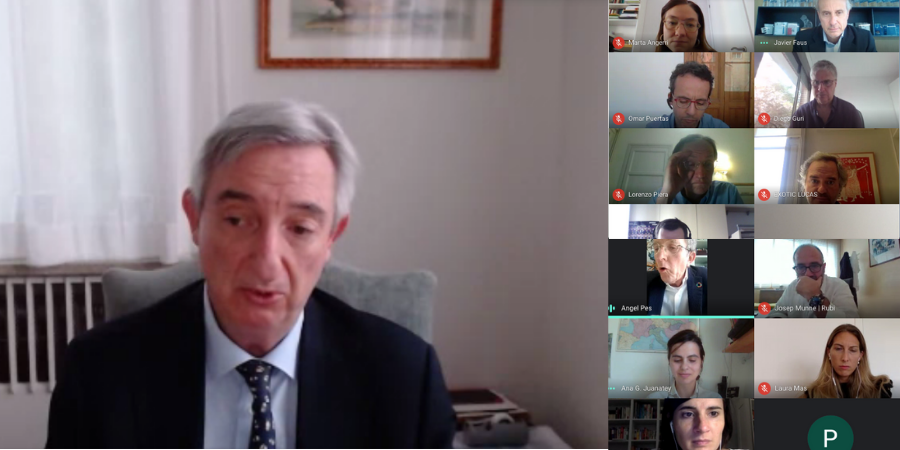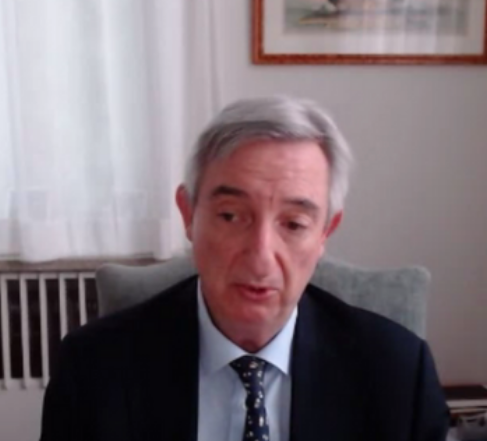The meeting began with a brief introduction by Dr. Ana G. Juanatey, in which she spoke about sustainable development during COVID-19. The academic commented on the price that the economies will have to pay to accelerate the economic recovery: the prioritization of the growth objectives before other global challenges, especially the environmental ones that are codified in projects such as the 2030 Agenda or the Sustainable Development Goals (SDGs). Along the same lines, Juanatey mentioned that currently several public administrations are dismantling many of the environmental regulations approved in the past. Before giving the floor to the ambassador, Dr Ana García Juanatey asked the ambassador what, in her opinion, would be the Chinese position on this dilemma.
The Hon. Mr. Rafael Dezcallar de Mazarredo began his speech with a brief contextualization on the growth of the Chinese economy, in which he emphasized its speed. The Asian country has been able, in a relatively short period of time, to eliminate large segments of poverty within its territory.

This economic growth, of course, has been translated into political influence in the International Community. For example, through the Belt and Road Initiative (IFR, BRI), which has made many investments in infrastructure around the world, with special attention to Asia and Africa. Although the ambassador highlighted the challenges that the Asian nation has ahead of today (high public and private indebtedness, the doubts generated by the development of its financial system, etc.) one of the long-term priorities of the great Asian country is technological development and the transition to the digital economy as a catalyst to develop projects based on artificial intelligence (AI). China has developed a parallel and competitive digital environment to that of the United States, and wants to create modern armed forces with the aim of being able to face the American influence in Hong Kong, Taiwan and the area of the South China Sea.
The relationship between China and the United States was one of the aspects that the ambassador analyzed in depth. Specifically, he spoke of the objective that the US has pursued since the Asian country began to develop: change the rules of the game of globalization, which in his opinion have favored China. In some cases, this translates into seeking decoupling, which consists of eliminating global value chains that it considers favorable to China. However, this carries a high degree of difficulty, as many large American multinationals rely on Chinese suppliers. Another complication that the American government has with this strategy is the comparative advantages that the Chinese economy has today: it produces at a lower cost, it has large infrastructures and competitive suppliers as well as abundant and qualified labor and, finally, It has the largest internal market in the world.
Following this explanation, the ambassador described how the Chinese economy had reacted to the pandemic caused by COVID-19. Specifically, he mentioned that the virus affected global value chains and caused rising unemployment and the closure of many small and medium-sized companies. This happened at the beginning of the crisis, because the country was the focus of the pandemic, and later because international markets were severely affected. Although the initial blow was hard, since the outbreak arose within its borders, China has been the first to be able to control the pandemic, in addition to becoming the global supplier of medical supplies such as masks or respirators. This has sparked even more rivalry with the United States, which has resulted in a fight for the narrative about the pandemic, with consequences such as the US withdrawal from the WHO, which responds to the US strategy of targeting China as guilty of its extension.
In this context, what should the EU’s foreign policy be?
The solution, for the ambassador, is based on the European Union’s search for its own political and economic space, not in automatic alignment with China or the United States. The EU has the economic and political weight to be able to do it. Although the Union agrees with the United States on the fundamental political values that it defends and that China must open up its economy more, including the financial sector, it does not share the American position of waging a trade war with China or of ending globalization, global value chains and the multilateral system. Furthermore, China, despite its growing influence in Eastern Europe, sees the EU as a potential ally, which can be an effective counterweight to American influence.

In the case of Spain, the Hon. Mr. Dezcallar described the relations between both countries as good. He stressed that, in the eyes of China, Spain is not a secondary country, given its influence in Europe, the Mediterranean and Latin America. However, it has not been possible to take advantage of the full economic potential of this cooperation. Despite having a negative balance of payments with China (with a coverage rate of 23%), there are many possibilities to develop a good collaboration in different areas such as trade, investment, technology, tourism, fashion, etc. However, different factors in the recent situation of both countries, as well as the situation created by the pandemic since the beginning of 2020, have made it difficult until now to carry out short-term projects. In the future, there are very positive perspectives to fully develop the different fields of cooperation included in the Declaration approved on the occasion of President Xi Jinping’s visit to Spain in November 2018. Furthermore, at this time, China has set a goal of breaking the deadlock. development caused by COVID-19 to develop the internal market – unlike the strategy followed to emerge from the 2008 recession, based on construction and infrastructure – and here Spanish companies, especially those in the service sector, can develop interesting projects in the Asian country.
In short, China is clearly in a process of growth and development, although there are still sectors where it lags behind the US. However, the ambassador repeatedly stressed that China’s interest at the moment is to avoid dependence on third countries in key areas such as technology, economy or defense, rather than replace the US as a superpower in the international community.
Report prepared by Luis Tort-Martorell
Student of the Master in Diplomacy and International Organizations